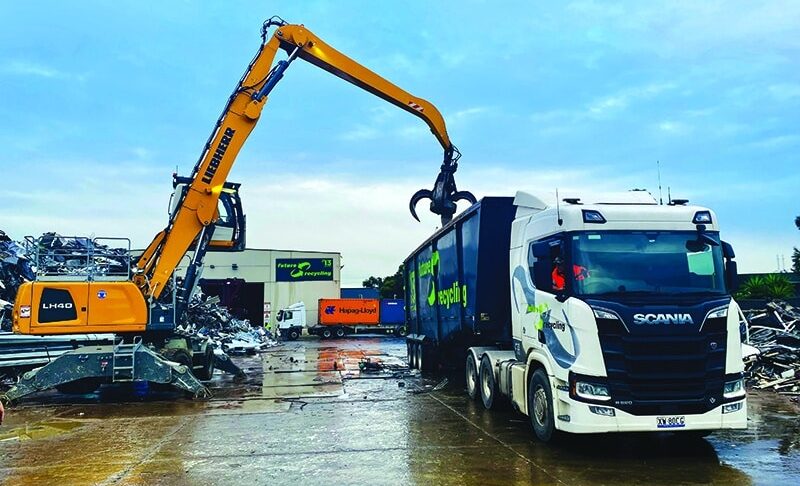Liebherr does the heavy lifting at Future Recycling

Future Recycling Managing Director Tyrone Landsman explains why manufacturer support for equipment is just as important as performance.
Like many ‘overnight’ success stories, Tyrone Landsman’s began more than 30 years ago.
He cut his teeth in the waste and recycling sector as a salesman, taking on various roles along the way. He’s now at the helm of Future Recycling, a burgeoning waste management company with metal recycling and waste transfer centres across Victoria.
Future Recycling has built a presence in resource recovery in Melbourne’s south-eastern suburbs. Key to its success is Tyrone’s ability to pivot the company to stay focused in the ever-changing environment in the waste and recycling industry.
“One of the key aspects of the business was always looking forward,” Tyrone says. “Over the journey we’ve grown substantially.”
Future Recycling began as Fletcher Metals, in Shepparton, country Victoria. It was purchased by Tom Garret and Stuart Miller in 2007 and Tyrone came on board in 2008 as the company looked to break into the Melbourne market.
National Metals was welcomed into the fold in 2008. In line with a strategy of diversification and growth, Pakenham Transfer Station was next in 2016.
In 2018, Future Metals, Cardinia Transfer Station and Pak Bin Hire became Future Recycling, with Tyrone as the sole director.
Tyrone has invested in infrastructure and equipment to ensure best practice at each of the facilities. In November 2022, a new Future Recycling Waste Transfer Station was opened next door to the original metal recycling facility at Hallam.
One of the key components of running a successful facility is equipment you can rely on. And for the heavy lifting required at both the Hallam and Dandenong sites, Tyrone called in Liebherr. A Liebherr LH 22 M material handler will be deployed to Hallam, while a larger, LH 40 M will be used at the Dandenong scrap yard.
“We want to make sure we’re running top material handlers,” Tyrone says. “When it comes to quality of the build, Liebherr is one of the best.”
The LH 22 M has a compact design, which makes it suitable for deployment in waste management and recycling. With the latest engine and hydraulics technology, a focus is on fuel efficiency while at the same time enhancing material handling performance.
Future Recycling has previously used excavators to move material around the yards, however Tyrone says operators had restricted vision. With material handlers, cabins are designed to be raised up to six metres, giving operators a clear view of the work site.
Another benefit is the ability to compact truckloads of material, helping achieve optimum carrying weight.
“If your optimum truck weight is 22 tonnes and you miss it by two tonnes every load for 11 trips, that’s an extra load you’re having to do,” Tyrone says.
“It’s important you can get your optimum weight every time.”
The Liebherr LH 22 M has a compact design, making it suitable for waste management and recycling facilities.
The LH 40 M is considered a top performing material handler. Its patented Energy Recovery System (ERS) ensures maximum handling capacity while at the same time lowering overall fuel consumption. This enables a more powerful, homogeneous, and faster work cycle.
The attachment of the machine is also available in a variety of versions. Future Recycling’s LH 40 M has a grab attachment with a magnet that enables an increase in lifting capacity of an additional three to four tonnes.
Tyrone says both material handlers are easy to use, efficient and reliable. But while performance is important, for Tyrone, manufacturer support is just as important.
Tyrone always buys new equipment and ensures it is maintained to minimise downtime at his sites. He says one of the attractions of the Liebherr material handlers was the location of the service centre – just down the road.
Future Recycling has full maintenance contracts with Liebherr for both the LH 22 M and LH 40 M, which means they are regularly serviced and maintained over a five-year period.
“Our core business is scrap metal recycling, it’s not running these machines,” Tyrone says.
“We use them to handle our material. We don’t want any downtime and we don’t want to run old machines or have spare parts lying around.
“With the price of major equipment, you want to make sure you have optimum use of them.”
Tyrone has built up a good rapport with the Liebherr Earthmoving and Material Handling team in Victoria.
He says while the LH 22 M and LH 40 M are relatively new additions to the Future Recycling stable, he’s keen to continue the relationship and build on the company’s position as a recognised waste management provider.
“Who knows,” Tyrone says, ”there could be more material handlers added down the track.”
Written by Lisa Korycki
First published in Waste Management Review July 11, 2023
Comments are closed.